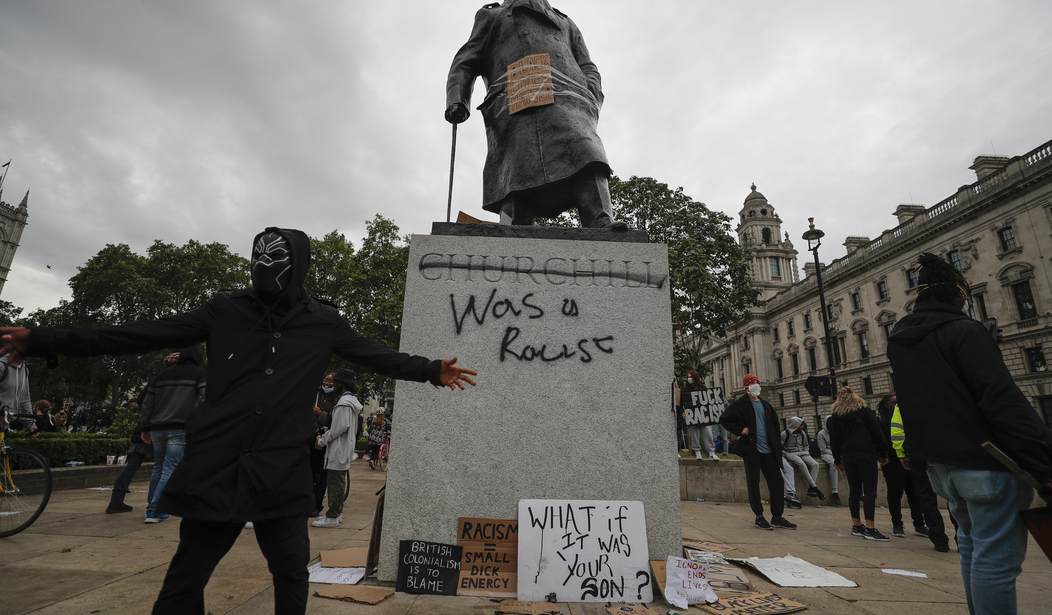It's all about religion, isn't it? "(W)e have the cult of social justice on the left," Andrew Sullivan wrote in New York Magazine, "a religion whose followers show the same zeal as any born-again Evangelical."
Linguist John McWhorter elaborated on that theme in The Atlantic. "(A)ntiracism," he wrote, "is a profoundly religious movement in everything but terminology."
McWhorter likened the notion of "white privilege" to original sin, argued that the hope that Americans will "come to terms with race" is as vague as hopes for Judgment Day and observed that the faithful on the lookout for "that which may be blasphemous" resort to social media shaming tantamount to "the excommunication of the heretic."
You could be pardoned for supposing that Sullivan and McWhorter were reflecting on the past week's events -- the epidemiologists piously proclaiming that participating in crowded protests of police racism was more important than the otherwise sacred duty of social distancing, the chastened suburbanites in Bethesda, Maryland, kneeling before and asking forgiveness of black fellow citizens.
But actually, their quoted comments both appeared in magazines dated December 2018. They nevertheless proved apt as commentary on events no one then imagined.
Sullivan and McWhorter understood that we have been living for two decades in a political era during which the demographic factor most highly correlated with voting behavior is religion, or, within each sectarian group, the degree of religiosity.
They observed that the era produced, for the first time in American history, a partisan division between the largest metropolitan areas and the rural and small-town areas outside metropolitan boundaries. Our coastal metropolises voted 3-1 for Hillary Clinton while rural areas north and south, except for Vermont and the Berkshires of Massachusetts, voted 3-1 for Donald Trump.
Recommended
While non-metropolitan voters, as Barack Obama noted in 2008, still tend to cling to traditional religion, articulate white metropolitanists are increasingly comfortable defining themselves as atheists and characterizing their religion as "none."
They believe instead in Science, with a capital S. Science, they claim, justified the two-month coronavirus lockdowns and the need, until the protests against police misconduct that resulted in the death of George Floyd, to maintain them.
Actually, scientific advice kept changing -- understandably, since epidemiological models of a novel virus made projections refuted by evolving evidence. And epidemiology has an understandable bias toward pessimism, since society wants warnings against unlikely but disastrous downside risks.
Science, moreover, provides no convenient formula for weighing the predicted benefits of lockdowns against their large and incommensurate costs. That requires judgments based on your values -- which is to say, in many cases, on your religion.
So, urban liberals insisted on strict limits on traditional religious services, symbolized by the vexed tone of New York City Mayor Bill de Blasio's denunciation of an Orthodox Jewish funeral. But they quickly bent themselves into logical pretzels by endorsing crowded mass anti-racism protests. My (tolerant, modern, progressive) religion is better than your (parochial, antiquated, traditional) religion.
Is this conflict really necessary? Overwhelming majorities of Americans believe the Minneapolis police officers acted wrongly and support peaceful protests. Traditional Christianity preaches the moral equality of every individual -- a position consistent with believers in secularized anti-racism.
And large majorities believe that violent rioting is wrong -- and support sending in the National Guard and, if necessary, even the military, to end it. But here there's a collision with believers in the woke religion of anti-racism, at least if young staffers in The New York Times newsroom are indicative. They demanded -- and got -- the editorial page editor to resign (be fired) for having run an opinion article by a Republican senator in which he urged deploying the military when necessary to stop rioting.
Absent from the catechism of the woke anti-racism religion is any acknowledgement of the facts, cited repeatedly by the Manhattan Institute's Heather Mac Donald, that police shootings of blacks have become exceedingly rare. Christianity asserts that original sin will always be with us, but racism in America has been in long-term deep decline.
Protests have featured confessions of sin and demands for reforms. Some demands -- "defunding the police" -- are so lunatic that Democratic politicians have been skittering away and explained that "defunding" doesn't mean defunding. Others -- like requiring police cameras -- are already widely in use or not particularly controversial. Some are not familiar but bear serious consideration: Police officers' qualified immunity from federal civil rights lawsuits, instituted by then-Chief Justice Earl Warren and a unanimous Supreme Court in 1967, could be abolished or altered by the court or Congress.
Unfortunately, historical perspective, statistical literacy and any need for consistency are not of much importance to practitioners of the religion of anti-racism.
Michael Barone is a senior political analyst for the Washington Examiner, resident fellow at the American Enterprise Institute and longtime co-author of The Almanac of American Politics.























Join the conversation as a VIP Member